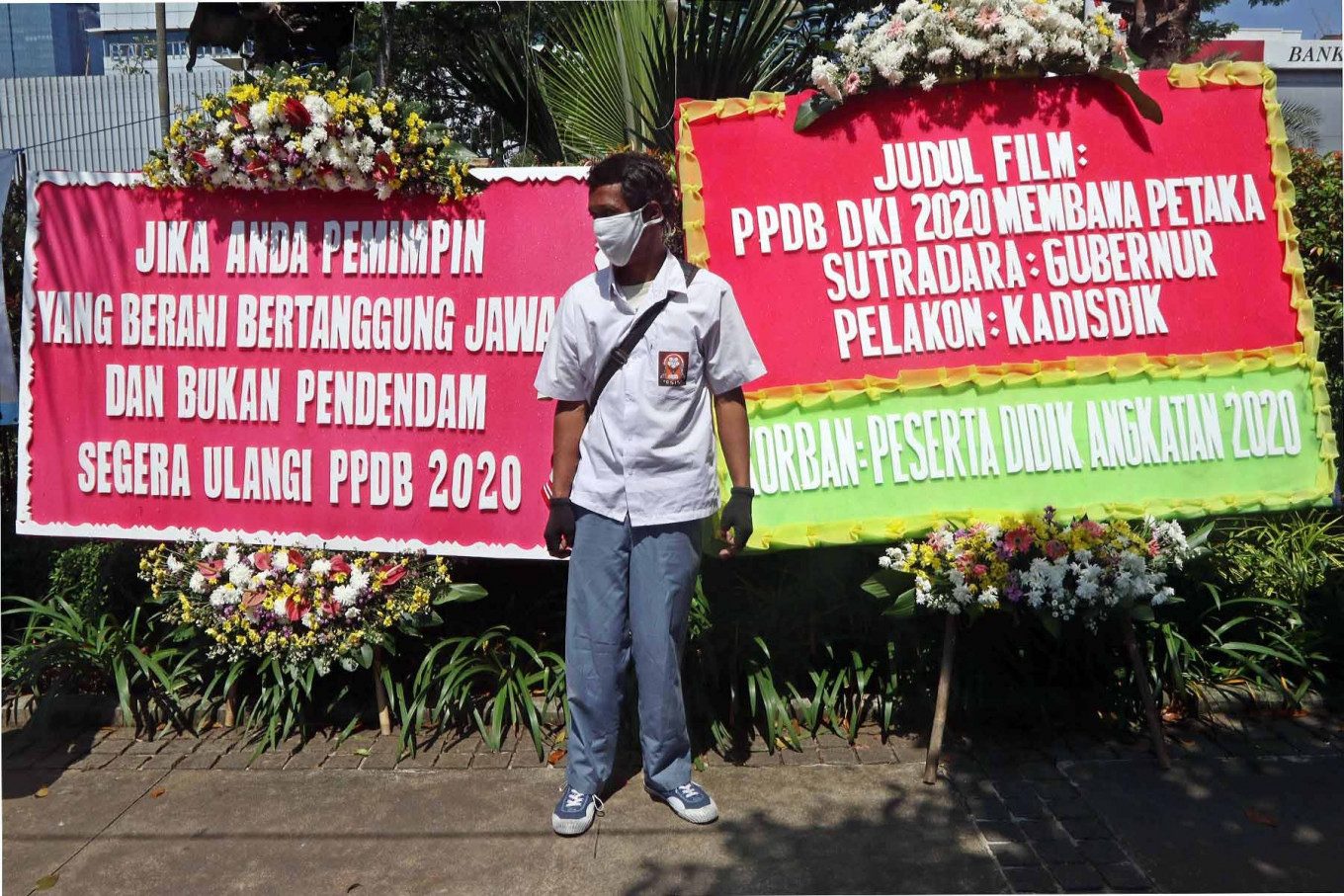Popular Reads
Top Results
Can't find what you're looking for?
View all search resultsPopular Reads
Top Results
Can't find what you're looking for?
View all search resultsUnderprivileged students in focus after Jakarta wraps up state school enrollment
This year’s public school enrollment procedure in Jakarta uses a combination of zoning and preferential systems.
Change text size
Gift Premium Articles
to Anyone
T
he Jakarta administration ended its public school enrollment period last week, but its effects are still felt among underprivileged students and their financially-strapped parents.
Titin Suwanti, 52, still feels bewilderment every time she thinks about her child’s tuition. She has had to enroll her 15-year-old son, Kamali Ridhlo, at a private vocational school in South Jakarta, because she was not able to secure a spot for him at a local public school.
Titin makes ends meet by doing odd jobs, mostly as a cook for catering services. But the COVID-19 outbreak has affected the business and she is unable to find another source of income. Titin has two school-aged children and a husband who suffered a stroke under her wing.
For her son’s private school, she has to pay a Rp 2.6 million (US$177.82) admission fee and Rp 310,000 monthly tuition.
At the very least, Titin was grateful that the city administration would be paying for some of the fees – her son is an eligible recipient of the Jakarta Smart Card Plus (KJP Plus) program, which aims to provide financial aid for students from lower-middle-income households.
The administration will pay Rp 240,000 for monthly tuition and another Rp 450,000 for other school purposes for vocational high school students studying in private schools, according to provisions on kjp.jakarta.go.id.
But state assistance is not always enough.
Titin said she had asked the school to allow her to make payment in arrears, especially for the admission fee.
“I said that if I have the money, God willing, I will pay for it. Alhamdulillah [thank God], the school understands,” she told The Jakarta Post this week.
“I really hope the fees can be paid off by the administration because in private schools, we still have to buy books and other things that will cost us more money.”
Titin said her son wanted to go to a public senior high school (SMA) located near his old junior high school (SMP) but he was pushed out of the registration list by kids who were older but had lower academic scores.
Read also: Jakarta parents protest age ‘discrimination’ in school enrollment
Kamali is not alone. There are about 300 hundred students – KJP Plus recipients – who are unable to continue studying at public schools this year, according to Syah Dinihari, chairman of the Indonesian Education Advocacy Volunteers (RAPI) group.
Some among them have enrolled in private schools while others have not, mostly because they cannot afford the admission fees, Syah told the Post recently.
The parents of those students staged a protest in front of City Hall on Monday. They demanded the administration evaluate this year’s selection criteria and to help KJP Plus recipients continue their studies.
This year’s public school enrollment procedure in Jakarta uses a combination of zoning and preferential systems. Both systems use age as a determining factor in the selection process, replacing the system based on national exam scores from last year.
This change has sparked anger among parents whose children are unduly affected, even though the Education and Culture Ministry has said the policy does not violate regulations.
The relevant ministerial decree stipulates that age could be used as a determining factor if the quota was already filled but there were students on the waiting list who lived a similar distance away from a particular school.
It would be difficult to monitor distance as it was something that could be easily “circumvented”, city education agency head Nahdiana said, citing instances where parents purchased property close to a school to secure enrollment.
From this year’s enrollment process, there were 7,758 vacant seats at all public school levels, which comprise 6.71 percent at elementary schools (SD), 0.79 percent at SMP, 0.7 percent at SMA and 1.72 percent at vocational high schools (SMK).
Most vacant seats in elementary schools were located around commercial office buildings – further away from residential areas – and in Thousand Islands province. However, Nahdiana insisted there would be no further enrollment to fill the vacant seats.
Under the current circumstances, she said the agency had been collecting data on prospective students held back by an economic burden.
“We are collecting data on children who were not accepted into states schools, specifically KJP Plus recipients. We are also coordinating with the Religious Affairs Ministry so that [potential students] are accepted at schools under the ministry’s authority,” the official said, referring to madrasah (Islamic schools), on Tuesday.
Nahdiana also said the agency was communicating with private schools on accepting potential applicants who were unable to pay admission fees.
Imam Parikesit, chairman of the Private Education Consultative Body’s Jakarta chapter, said the city education agency had asked to be given six months to come up with a solution for payment in arrears for school admission fees borne from students under financial distress.
Satriawan Salim, the deputy secretary-general of the Federation of Indonesian Teachers Associations, said the education agency should fulfill its commitment to providing financial assistance for formal education to students from lower-to-middle-income households.










